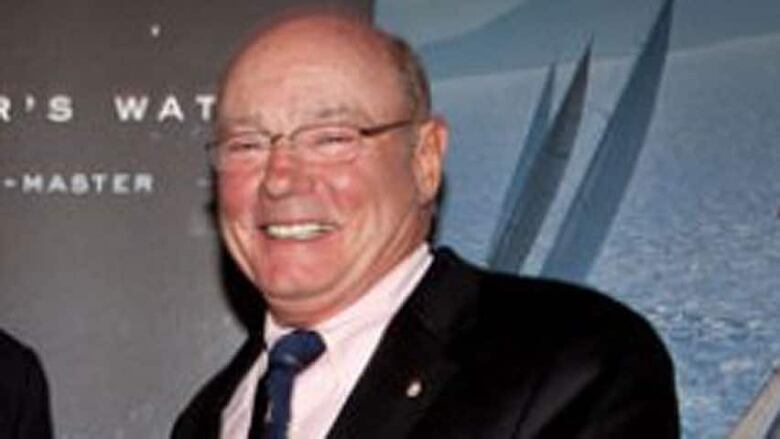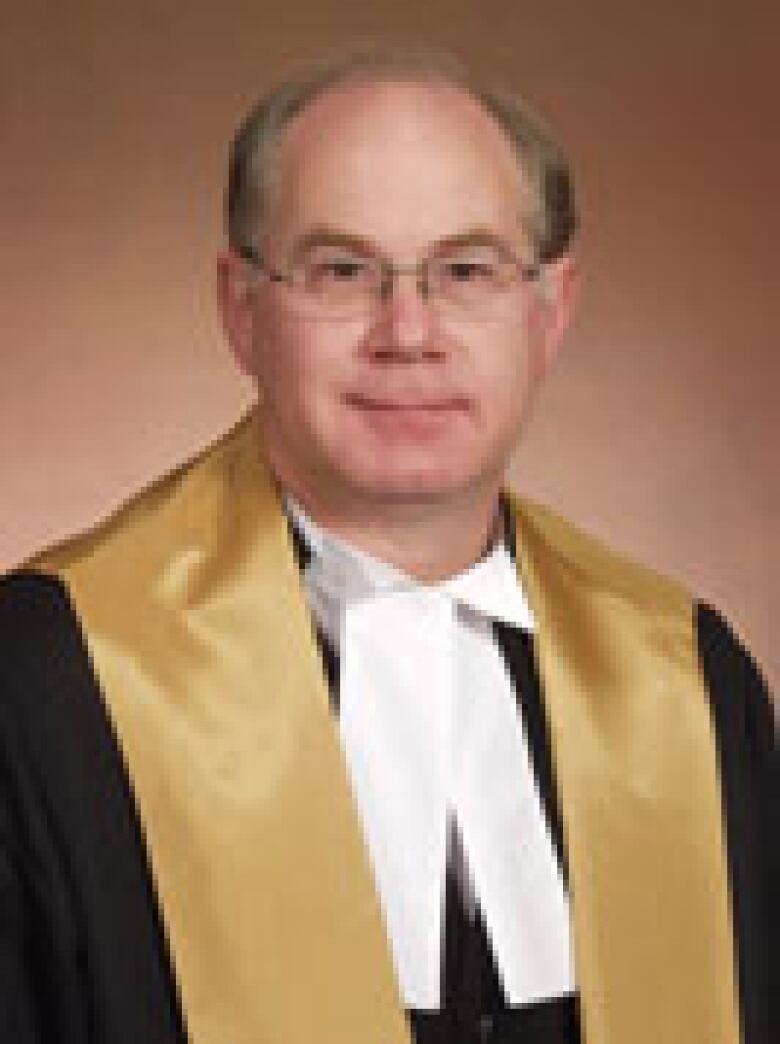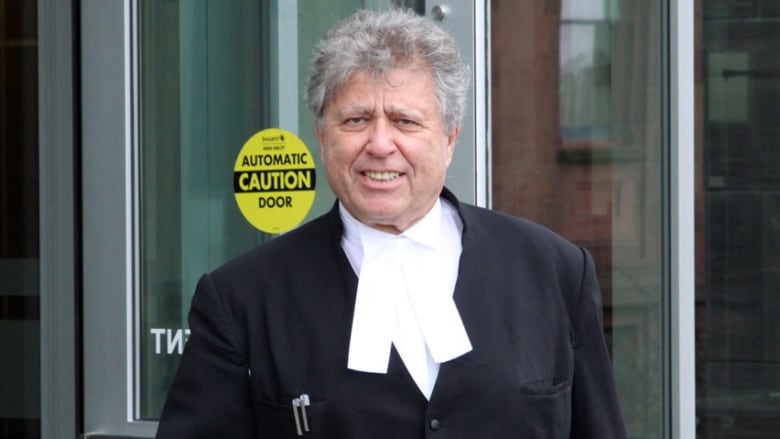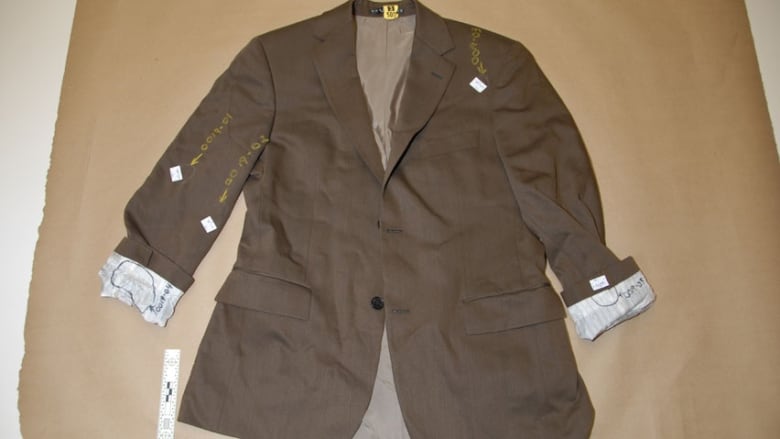Dennis Oland bail decision could be precedent-setting in New Brunswick
N.B. man, 47, received life sentence in 2nd-degree murder of dad Richard Oland

Dennis Oland will have to wait until next week to learn whether he'll get bail pending an appeal of his conviction for the second-degree murder of his father, wealthy New Brunswick businessman Richard Oland.
A bail hearing washeld in New Brunswick's Court of Appeal in Fredericton on Friday,just oneday after Oland, 47, was sentenced to life in prison with no chance of parole for 10 years in the 2011 killing.
But after hearing arguments from both the defence and the Crown on whether Oland should be released,Justice Marc Richard announced he would reservehis decision on the potentially precedent-settingcase until Wednesday at 2 p.m. AT.
"I wish thiswas a case I could decide today.I know there's a lot of interest in it," Richard said, adding he has a lot to consider.
- On mobile? Follow liveblog of bail hearing here
- Dennis Oland pressured to confess to father's murder by police
- Dennis Oland gets life in prison for killing father, Richard Oland
IfOlandwere to be released, itwould be the first time in New Brunswick history a convicted murderer is granted bail, according to NicoleO'Byrne, an associate law professor at the University of New Brunswick.
The Crown says they found only 21 such cases across Canada.
This is not a normal, everyday occurrence.- Nicole O'Byrne, associate law professor
"This is not a normal, everyday occurrence," O'Byrne said. "So the exceptional circumstances part of the test is the key determining factor here. So Justice Richard has to figure out if this case fits within that exceptional circumstances category."
Oland, who was sitting in the prisoner's box in a brown suit jacket andshackles, flanked by sheriff'sdeputies,showed little reaction to the adjournment, which will see him spend his48thbirthday on Sunday behind bars.
However, hiswife, LisaAndrik-Oland,mother ConnieOland and about a dozen otherfamily members and friends who filled the small courtroom to near capacity were visibly disappointed. None of them offered any comments following the proceedings.

DennisOland, his only son, was the last known person to see him alive.
Olandwasfound guiltyby a jury in Court of Queen's Bench in Saint John on Dec. 19, following 30 hours of deliberations over four days.
Oland'slawyers contend his conviction wasan"unreasonable verdict,"and thatJustice John Walsh erredin his instructions to the jury and in determining the admissibility of some evidence.They are seeking to have the conviction quashed,and either an acquittal entered or a new trial ordered.
Appeal date before October unlikely
A date for the appeal hasn't yet been set. The court heard Friday the appealprobably won't be heard until at least October because a transcript of the three-month trial has to be prepared first.
Defence lawyerAlan Gold, whopresentedon behalf of the three-member defence team at the bail hearing, argued Olandshould be freed until then.

The public's confidence in the administration of justice is "fostered" when bail is granted "where appropriate, when legal requirements are met," he said.
Gold also stressed Oland's "positive character" and the "considerable support" hehas among family, friends and others in the community.
He also referred to Oland's case as being on the "lower end" of the murder spectrum, closer to manslaughter.
The defence filed a significant amount of material in writing for the judge's consideration, butRichard asked Gold to highlight what he felt were the strongest points.
Gold referred to thenoises Anthony Shaw heard coming from Richard Oland's office on July 6, 2011, around 7:30 p.m. Gold argued the noise must have been the sounds of Oland being killed and the trial saw a timestamped security video that shows Dennis Olandshopping in Rothesay about a 20-minute drive away.
He suggested the trial judge erred in his instructions to the jury by referring to Shaw's testimony as being "inconsistent" with the fact that Richard Oland had stopped responding to all calls and texts about 45 minutes earlier.

The admissibility of Dennis Oland's brown sports jacket is also a "crucial" legal issue, he said.
Oland told police he was wearing a navy blazer when he visited his father on the night in question, but video surveillance showed he was wearing a brown jacket. A brown jacket seized from his bedroom closet a week later was found to have three small bloodstains on it and DNA that matched the victim's profile.
Gold contends the search warrant Saint John police obtained to seize the jacket did not authorize them to test it forensically.
Public confidence in justice system key
Crown prosecutor Kathryn Gregory argued most convicted murderers file appeals. Very few, however, are granted bail pending appeal, and only in "exceptional circumstances."
Of the 21 cases cited, seven of them, for example, involved ministerial reviews, two involved "fresh evidence" and another two, "possible consent."
The question is, what is it about this case and the grounds that have been raised that suggests somethingunusual?- Kathryn Gregory, Crown prosecutor
"So the question is, what is it about this case and the grounds that have been raised that suggests something unusual?"
Gregory suggested all of the issues raised Friday by the defencewere already argued and determinedby the trial judge.
The judge did not comment on whether Oland'scase is exceptional. He did comment, however, that it's not a typical case, pointing out that it took more than two years before police laid charges and that it was "pretty much purely circumstantial."
"Actually, I think it is 100 per cent circumstantial," he added.
Gregory suggested the strongest argument could be the estimated eight-month delay before Oland's appeal could be heard; whether that would make his case "exceptional."
She said there has neverbeen a decision wheredelay has been the sole basis for release, but acknowledged "it's a factor."
Crown would seek $400K in sureties
The Crown is not concerned about public safety in this case, but she did express concern about the public's respect and confidence in the justice system if Oland were to be released.
She stressed a jury of 12 people who sat through the lengthy trial, saw and heard all of the evidence, delivered a unanimous verdict of guilty.
If Olandis ultimatelygranted bail, the Crown will be seeking $400,000 in sureties half from his mother, Connie Oland,and half from his uncle, Derek Oland, the executive chairman of MooseheadBreweries Limited.

Those included surrendering hispassport, advisingpolice of any travel outside New Brunswick,maintaininghis residence in Rothesayand advisingpolice of any change of address.
There are varying opinions on Oland's chances of getting bail.
Christopher Hicks, a Toronto lawyer who specializes in murder cases and isn't connected to the Olandcase, has said Oland is "virtually assured" of being released pending the appeal.
"Someone who'sbeen convictedeven of a very serious crimethe most serious crime of the CriminalCode who has good grounds of appeal, should not remain in custody while his appeal is heardThat'sthe law from the Supreme Court of Canada,"Hicks said.
ButO'Byrnecontends it's a "tricky question."
"The key issue is whether Oland could establish a meritorious appeal to overcome the presumption that the release of a convicted murderer would destroy the public's confidence in the administration of justice," she has said.
Dennis Oland arriving for his bail hearing this morning in Fredericton pic.twitter.com/F3qUIFhcxi
—@BJMCBC











_(720p).jpg)


 OFFICIAL HD MUSIC VIDEO.jpg)
.jpg)



























































































